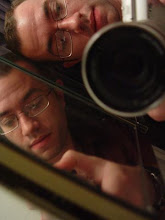
I've somehow managed to live 31 years on this earth and have been an avid film buff for half of them, yet until a couple days ago I had somehow managed to have never seen a film by Ingmar Bergman. How someone can keep a film blog and never have seen "The Seventh Seal" I don't know. I suppose that would have been the place to start, being his most well known film. But that's not where I started. I organize a film discussion group that meets every month and this month we chose three films that are favorites of Woody Allen. "The Bicycle Thief", also one of Allen's favorites, was the subject of my first blog post. The second was Bergman's "Wild Strawberries."
I'm not that knowledgeable about Woody Allen so I'm not really qualified to discuss how it relates his work but these are my thoughts about "Wild Strawberries" in general. Knowing the context in which a film is released really heightens your appreciation of it. For instance, without context you might look at most of the French New Wave as incredibly dull. There's nothing shocking about "Breathless" if you've ever been exposed to "Pulp Fiction". Regarding Bergman's films, I'm pretty much without the context of his other films or Swedish films in general. Wikipedia tells me "the film is often considered to be one of Bergman's most emotional, one of his most optimistic, and one of his best." If this is one of his most emotional then I understand why "The Seventh Seal" is regarded as such a cold and distant film.
I will admit that I had trouble relating with the characters. The actors and characters are likable, yet Bergman remains at a cautious distance. Isak's flashbacks to his childhood don't really convey any kind of warmth yet I feel that's what the director intended with those scenes. Instead, an uncomfortable Luis Bunuel vibe creeps into the scenes that are supposed to be pleasant memories and the surrealism is really racheted up once Isak starts having nightmares.
The film is essentially a man reflecting back on his life as he is about to receive an honorary degree. The film takes place during the trip from his home to the university. He is accompanied by his daughter-in-law. Along the way they stop to pick up some hitchhikers and a couple of stranded motorists and even stop by Isak's childhood home which gives him an opportunity to reflect.
While I wasn't particularly moved by any of the flashback scenes, there was one scene that I thought was brilliant. In the back seat of the car we have the three youthful hitchhikers, so full of life and energy. In the middle seat (really, how big is this car?) sit a bickering middle-aged couple. And the front seat is occupied Isak and his daughter-in-law Marianne. It's three stages of life sharing the same car. Marianne eventually asks the argumentative couple to get out and we find out later that she has recently had an argument with her own husband and fears becoming like that couple. Isak, on the other hand, has already been through a rough marriage and is all the wiser for it. But even in old age his wisdom doesn't save him from regret and self-doubt as his dreams start to become more painful reminders of his failings.
It does end on what Bergman intends as an optimistic note, which is another childhood flashback. Like I said, I didn't feel that the flashback scenes were very successful and I think the success of the movie depends on how you perceive those scenes. There were enough interesting ideas in this film to make me curious about Bergman's other films. "The Seventh Seal" is already in my Netflix queue.


Seventh Seal happened to have been made in the same year too.
ReplyDeleteAnd the old guy in Strawberries is Victor Sjostrom, kind of the father of Swedish cinema, if I remember correctly.
ReplyDelete